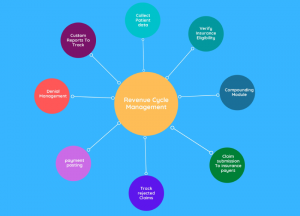Revenue cycle management is the process of managing all financial transactions in a healthcare organization, from patient scheduling and insurance verification to claims processing and payment collection. By effectively managing the revenue cycle, healthcare organizations can improve their overall financial health and better serve their patients.
Some key components of revenue cycle management include accurately coding medical procedures, submitting clean claims to insurance companies, following up on denied or unpaid claims, and collecting patient payments. By efficiently managing these tasks, healthcare organizations can decrease their accounts receivable and increase their revenue.

Effective revenue cycle management also includes ongoing analysis and optimization of processes to improve financial performance and ensure compliance with regulations. With the rapidly changing healthcare industry, it is important for healthcare organizations to continually assess and improve their revenue cycle management strategies.
Overall, effective revenue cycle management is crucial for the financial success of healthcare organizations and for providing high quality patient care. An awesome RCM software for healthcare example.
Revenue cycle management software can also be used to streamline and improve the revenue cycle process. This software typically includes features such as claims management, electronic health records, and financial reporting. Using this type of technology can help healthcare organizations optimize their revenue cycle and better serve their patients.
It is important for healthcare organizations to continually assess and improve their revenue cycle management strategies in order to stay competitive in the rapidly changing healthcare industry. Effective revenue cycle management can lead to improved financial performance and better patient care. Using revenue cycle management software can also help streamline the process and enhance overall efficiency.
RCM software checklist
1. Does the software have a user-friendly interface?
2. Can the software integrate with other systems and platforms?
3. Is there support available for the software?
4. Are there customizable options for reporting and data analysis?
5. Is the software scalable to accommodate future growth in operations?
6. Does the software have a secure system for data storage and protection?
7. Is there an option for remote access to the software?
8. Are there regular updates and upgrades available for the software?
9. Is training provided for the software?
10. Are there any additional costs for add-ons or features?